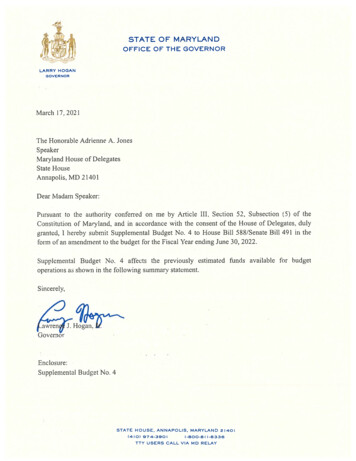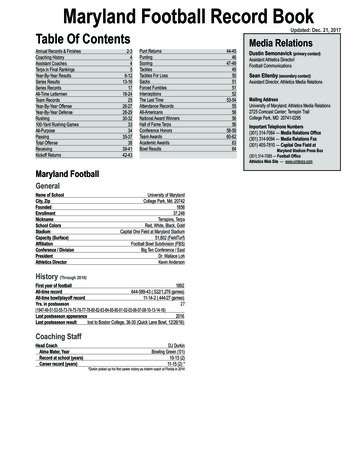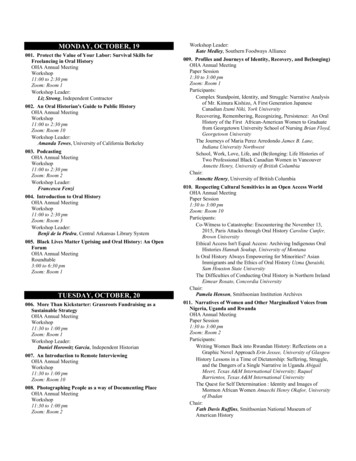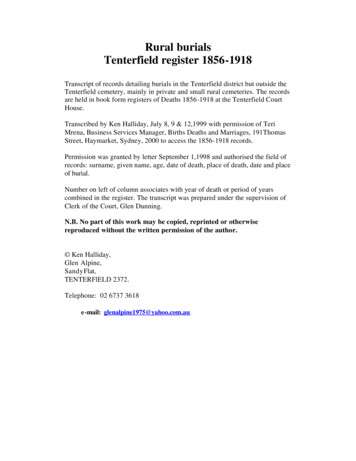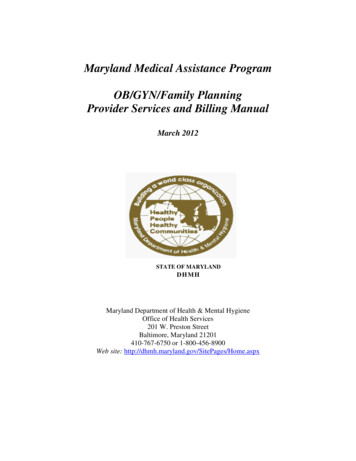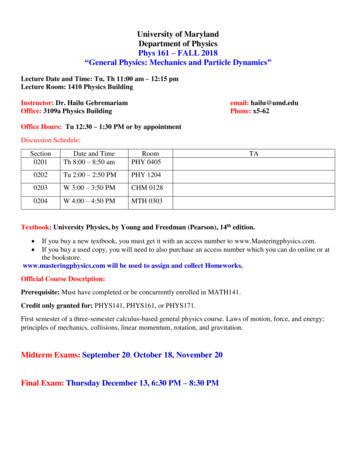
Transcription
University of MarylandDepartment of PhysicsPhys 161 – FALL 2018“General Physics: Mechanics and Particle Dynamics”Lecture Date and Time: Tu, Th 11:00 am – 12:15 pmLecture Room: 1410 Physics BuildingInstructor: Dr. Hailu GebremariamOffice: 3109a Physics Buildingemail: hailu@umd.eduPhone: x5-62Office Hours: Tu 12:30 – 1:30 PM or by appointmentDiscussion Schedule:Section0201Date and TimeTh 8:00 – 8:50 amRoomPHY 04050202Tu 2:00 – 2:50 PMPHY 12040203W 3:00 – 3:50 PMCHM 01280204W 4:00 – 4:50 PMMTH 0303TATextbook: University Physics, by Young and Freedman (Pearson), 14th edition. If you buy a new textbook, you must get it with an access number to www.Masteringphysics.com.If you buy a used copy, you will need to also purchase an access number which you can do online or atthe bookstore.www.masteringphysics.com will be used to assign and collect Homeworks.Official Course Description:Prerequisite: Must have completed or be concurrently enrolled in MATH141.Credit only granted for: PHYS141, PHYS161, or PHYS171.First semester of a three-semester calculus-based general physics course. Laws of motion, force, and energy;principles of mechanics, collisions, linear momentum, rotation, and gravitation.Midterm Exams: September 20, October 18, November 20Final Exam: Thursday December 13, 6:30 PM – 8:30 PM
Important Notes:1. Lectures:Students are required to attend lectures, where announcements will be given, exams will be announced andadministered, and the course material will be presented.Not all material will be directly covered in lectures. Students are responsible for reading andunderstanding all material in assigned chapters, whether or not this material is explicitly treated in thelectures.This Physics course is extremely fast paced and demanding. You will be learning new concepts everylecture and missing even one lecture can make you fall behind simply because the concepts build on theones covered in earlier sessions. Hence, attendance to lectures and discussions are mandatory.2. Discussions:You must attend your discussion section and you must go to the section you have been assigned. Your TAwill cover material (homework and exams) that may not be covered elsewhere. Please come prepared soyou can ask questions, i.e. read the assigned chapter and work on the homework problems. Remember, theTA is there to explain things and give help when you are stuck, not to dole out answers.In addition, there will be quizzes during most of the discussion sessions. Quizzes will be closed book, butall formulae will be provided for you. The quiz problems will be largely straightforward and are intendedto check your competency in topics from recent homework assignments. I will drop your lowest quiz scorebefore computing your average.3. Lab – There is NO lab for PHYS 161.4. Homework Assignments:Homework will be done through Mastering Physics. You must submit your answers for the homeworkproblems over the internet using the Mastering Physics web site.Registering and Gaining Access to Mastering Physics: In order to turn in your homework, you will need to register at the Mastering Physicswebsite http://www.masteringphysics.com/. To register, you need two things - an access number and the course ID. When you buy (new or usedcopy of) your textbook you will need to purchase a Mastering Physics access key number. Theeasy way to do this is to simply buy it on line from the above MP website.Your course ID is: MPGEBREPHYS161FA18There are several advantages to electronic homework submission:(1) You will know right away if your answer is right or wrong(2) If you give a wrong answer, you can go back and try again to see if you can get the correct solution.You will be allowed 5 attempts for each question, so don’t waste them.(3) You are graded only on your final answers and get your score when you are done.(4) The site also has a tutorial capability that you may find helpful.
Note that the software may randomize the numbers each time you make a new attempt on a problem, so becareful and remember that other students working on exactly the same problems are likely to have differentnumbers. The best way to do physics problems is first to work out carefully a general analytical solution tothe problem and then plug in the numbers at the end. This is especially true if the numbers are beingrandomized each time so everyone has different numbers.Why You Need to do the Homework: One of the main ways you can understand Physics is by doing thehomework. Do not wait until the night before it’s due to start working on your homework. The homeworkcan be expected to be difficult and it counts a lot towards your final grade in enabling you to succeed onyour exams. A sure way to get an F in this course is to not do the homework or not give yourself enoughtime to work on it. Late homework will incur a penalty.5. ExamsThere will be three mid-term exams and a one 2 Hr. Final exam. You must take the Final exam in order topass PHYS161.All exams are closed book and closed note exams. For each exam, you may have one “cheat sheet” thatcontains physical constants and formulas. You may also have a calculator.NO Exam will be dropped.6. Grading:The final grade will be based on the components with the following weights:Three mid-term exams: 3 x 15 % 45 %Comprehensive Final Exam 30 %Homework 15 %Participation, and Quizzes 10 %The final grade will be set at the end of the semester after all work is completed. In assigning the finalgrade, I will be guided by the University of Maryland grading policy, quoted below: A , A, A- denotes excellent mastery of the subject and outstanding scholarship. (90-100) B , B, B- denotes good mastery of the subject and good scholarship. (80-90) C , C, C- denotes acceptable mastery of the subject and the usual achievement expected. (70-79) D , D, D- denotes borderline understanding of the subject. It denotes marginal performance, and it doesnot represent satisfactory progress toward a degree. (60-70) F denotes failure to understand the subject and unsatisfactory performance. ( 60 )At the end of the semester all exam, quiz and homework grades will be added with the above weightingand a final letter grade will be assigned depending on the distribution of total scores.7. ExcusesMissing an exam is not allowed without a valid documented excuse as defined by the University (medicalproblem, religious holiday, or serious family crisis). In all cases, a makeup exam must be completed in areasonable amount of time or you will receive a score of zero for the exam. The makeup test or assignment,
and the due date, must be arranged by consulting with the Professor as soon as possible after it becomesapparent that an exam date will be missed. Turning in late homework is not encouraged as it will result in areduction of 10% of the points for every day late. If you are going to miss an assignment because of areligious holiday, it is your responsibility to inform the instructor in advance so that suitable arrangementscan be made.8. Students with Disabilities:Students with disabilities should meet with the instructor at the beginning of the semester so thatappropriate arrangements can be made to accommodate the student's needs.9. Academic Integrity:All students will be expected to comply with the University of Maryland's academic integrity policies,including the code of academic integrity and the honor pledge. Failure to comply will result in a failinggrade and will be reported to the Honor Council.10. University closure:In the event of a University Closure the department will do its best to accommodate students byscheduling make-up sessions or revision of the lab schedule.
Phys 161 Schedule for FALL2018 (subject to change).Week 1Week 2Week 3Week 4Week 5DateTopics08/2808/30Discussion of the syllabus, IntroductionMath, Units, Sig FigsVectors1.7 – 1.1009/04Vectors1.7 – 1.1009/06Motion in a straight line2.1-2.309/11Motion in a straight line2-4-2.609/132D Motion – Projectile Motion3.1-3.309/18Circular Motion, Relative Motion3.4-3.509/20Exam 1Ch 1 – 309/25Newton’s Laws of Motion4.1 – 4.61.1 – 1.609/2710/02Newton’slaw applicationndNewton’s 2 law application5.1 - 5.35.4 - 5.510/04Work and Kinetic Energy6.1-6.2Week 710/0910/11Work and Energy with Varying Forces, PowerGravitational, Elastic potential energy6.3 – 6.47.1 – 7.2Week 810/16Conservative forcesForce and potential energy, Energy diagrams7.3 – 7.510/18Exam 2Ch 4 - 710/23Impulse and Momentum8.1 – 8.210/25Conservation of Momentum8.3 – 8.610/30Rotational Kinematics9.1 – 9.211/01Torque, Moment of Inertia & Rotational energy9.3 – 9.411/0611/0811/1311/15Moment of Inertia calculationsRotational DynamicsEquilibrium and Center of GravityStress, strain, and Elasticity9.5 – 9.610.1 - 10.711.1 – 11.311.4 – 11.511/20Exam 3Ch 8 - 10Week 6Week 9Week 10Week 11Week 12Week 1311/22Week 14Week 1511/2711/2912/0412/062ndChap.SectThanksgiving Break - NO CLASSPressure in a Fluid, Buoyancy, Fluid FlowLaw of Gravitation, Kepler’s lawsSimple Harmonic MotionSimple Harmonic MotionThursday, December 13, 20186:30 – 8:30 8
09/06 Motion in a straight line 2.1-2.3 Week 3 09/11 Motion in a straight line 2-4-2.6 09/13 2D Motion - Projectile Motion 3.1-3.3 Week 4 09/18 Circular Motion, Relative Motion 3.4-3.5 09/20 Exam 1 Ch 1 - 3 Week 5 09/25 Newton's Laws of Motion 4.1 - 4.6 09/27 Newton's 2nd law application 5.1 - 5.3 Week 6 10/04

